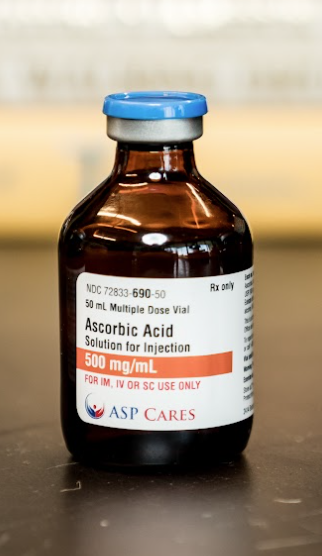When it comes to managing anemia, a condition characterized by a deficiency of red blood cells or hemoglobin in the blood, the term “iron infusion” might come to mind as a common treatment option. However, what if we told you that there’s more to the story than just the traditional iron infusion route?
In this comprehensive guide, we dive deep into the world of anemia, shedding light on symptoms, solutions, and alternatives that extend beyond the realm of iron infusions. Join us as we explore the landscape of anemia treatment, uncovering the significance of vitamin C infusions, and unveiling how a holistic approach to wellness can be achieved.
Whether you’re seeking to understand anemia better, exploring different treatment avenues, or curious about how vitamin C infusions fit into the equation, this article is here to provide insights and clarity on the topic. So, let’s embark on a journey of knowledge and discovery, delving into the realm of “Iron Infusions for Anemia Treatment.”

Anemia is a common medical condition that occurs when your body doesn’t have enough red blood cells or hemoglobin to carry sufficient oxygen to your tissues. Hemoglobin is a protein found in red blood cells that binds to oxygen and transports it throughout your body. Oxygen is vital for the proper functioning of organs and tissues, and when there’s a shortage of oxygen delivery, it can lead to a range of symptoms and health issues.
There are various types of anemia, each with its own underlying causes and characteristics. Some of the most common types of anemia include:
Iron-Deficiency Anemia: This is the most prevalent type of anemia. It occurs when your body lacks sufficient iron to produce hemoglobin. Iron is a crucial component for hemoglobin synthesis, and without it, your body can’t produce enough healthy red blood cells. This is an instance where one might get blood labs before being able to get iron infusions.
Vitamin Deficiency Anemia: Certain vitamins, such as vitamin B12, folic acid, and vitamin C, play essential roles in red blood cell production. Deficiencies in these vitamins can lead to anemia. This is why IV infusions with vitamin C and B12 can help with iron deficiency, especially when iron infusions are not available.
Chronic Disease Anemia: Some chronic diseases and conditions, such as chronic kidney disease or inflammatory disorders, can interfere with the body’s ability to produce red blood cells or affect hemoglobin levels.
Hemolytic Anemia: This type of anemia occurs when red blood cells are destroyed or removed from the bloodstream faster than they can be produced.

Anemia can manifest through a range of symptoms, which can vary in intensity depending on the type of anemia and its severity. Recognizing these symptoms is crucial for seeking timely medical attention and determining if you should start looking for iron infusions for anemia treatment. Some common symptoms of anemia include:

Iron infusions are a medical procedure used to treat anemia, particularly when oral iron supplements prove ineffective or cause gastrointestinal issues. During an IV iron infusion, a solution containing iron is delivered directly into a vein through an intravenous (IV) line. This allows iron to bypass the digestive system and enter the bloodstream directly, ensuring efficient absorption and delivery to the body’s cells.
The iron used in infusions is often in the form of iron salts or iron polymaltose complex. Iron infusions are usually administered in a healthcare setting under the supervision of medical professionals. They can take varying amounts of time, depending on the specific iron preparation and individual patient needs. These infusions cannot be done without a blood lab to indicate the current iron levels an individual already has. This is one reason, IV iron infusions can be difficult to come by. There are other IV treatments that can help individuals with anemia.
It’s worth noting that while iron infusions are a common treatment for anemia, Drp IV specializes in Vitamin C infusions, which can also play a beneficial role in managing anemia. Vitamin C is known to enhance the absorption of non-heme iron, the type of iron found in plant-based foods and supplements. By increasing the absorption of dietary iron, Vitamin C can contribute to addressing anemia. While we don’t offer iron infusions, our Vitamin C infusions can still provide valuable support for individuals managing anemia or seeking to optimize their iron levels.
While iron infusions are a common approach to addressing anemia, another alternative that Drp IV offers is Vitamin C infusions. These infusions can be particularly beneficial for individuals seeking to manage anemia or optimize their iron levels without undergoing traditional IV iron infusion procedures.
Vitamin C, also known as ascorbic acid, is renowned for its role in enhancing the absorption of non-heme iron, the type of iron found in plant-based foods and supplements. Non-heme iron can be more challenging for the body to absorb compared to heme iron, the type found in animal products. However, when combined with Vitamin C, the absorption of non-heme iron can significantly improve.
The mechanism behind this enhancement lies in Vitamin C’s ability to reduce iron from its ferric form to ferrous form, which is more easily absorbed in the intestine. This transformation occurs within the stomach’s acidic environment. Additionally, Vitamin C forms a complex with iron that prevents the formation of compounds that inhibit iron absorption.
By receiving a Vitamin C infusion, individuals can increase their body’s ability to absorb dietary iron more efficiently. This can be especially valuable for those managing anemia, as optimizing iron absorption contributes to overall iron levels in the body. While we don’t offer iron infusions, our Vitamin C infusions provide a unique and effective way to support individuals on their journey to addressing anemia and maintaining optimal iron levels
The duration of an iron infusion can vary depending on several factors, including the specific type of iron infusion, the individual’s health condition, and the healthcare provider’s recommendation. In general, most iron infusions take around 1 to 3 hours to complete. However, more complex cases or larger doses of iron may require a longer infusion time. Your healthcare provider will determine the appropriate duration based on your unique needs and circumstances. It’s essential to discuss the expected duration of the iron infusion with your healthcare team so that you can plan accordingly.
Iron infusions, while effective in treating anemia, may sometimes lead to certain side effects. These can include nausea, headache, dizziness, and muscle aches. Some individuals might experience allergic reactions, which can range from mild skin irritation to more severe symptoms like difficulty breathing. It’s essential to discuss potential side effects with your healthcare provider before undergoing an iron infusion.
Yes, iron infusions can be an effective treatment option for severe anemia. Severe anemia often results in significantly low levels of hemoglobin and iron stores, making it challenging for the body to recover without intervention. Iron infusions deliver iron directly into the bloodstream, rapidly increasing iron levels and allowing the body to produce more hemoglobin. However, the suitability of iron infusions depends on the individual’s medical history, overall health, and the underlying cause of the anemia.
Vitamin C infusions and iron infusions serve different purposes but can complement each other. Iron infusions deliver concentrated iron to increase iron levels and hemoglobin production, while Vitamin C infusions enhance iron absorption by transforming non-heme iron into a more absorbable form. Vitamin C infusions are particularly beneficial for individuals who want to optimize their iron absorption from dietary sources or supplements. While Drp IV does not offer iron infusions, our Vitamin C infusions provide a valuable alternative for those seeking to manage anemia and promote overall well-being.